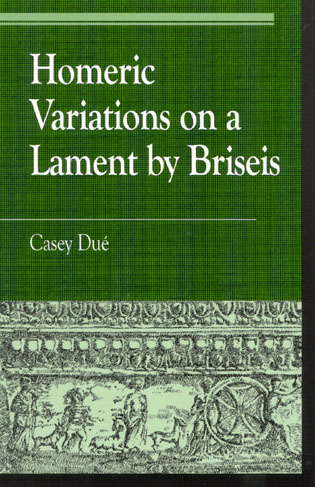Greek Studies: Interdisciplinary Approaches
Foreword by Gregory Nagy, General Editor
 Homeric Variations on a Lament by Briseis, by Casey Dué, centers on the figure of Briseis in the Iliad—who may seem at first sight to be marginal to the plot of that epic but who turns out to be essential to it—and even to the character-definition of the central hero of the Iliad, Achilles himself. Moreover, Briseis turns out to be a central character in local epic traditions that are still reflected, albeit indirectly, in Homeric poetry. Briseis thus becomes a most vivid illustration of the multiformity that typifies epic traditions in the preclassical Greek-speaking world.
Homeric Variations on a Lament by Briseis, by Casey Dué, centers on the figure of Briseis in the Iliad—who may seem at first sight to be marginal to the plot of that epic but who turns out to be essential to it—and even to the character-definition of the central hero of the Iliad, Achilles himself. Moreover, Briseis turns out to be a central character in local epic traditions that are still reflected, albeit indirectly, in Homeric poetry. Briseis thus becomes a most vivid illustration of the multiformity that typifies epic traditions in the preclassical Greek-speaking world.
In the classical period and beyond, Briseis is appreciated as an exquisite literary construct inherited from Homer as the ultimate artist. For a Roman poet like Propertius, she is a masterpiece of artistic characterization, a model for the esthetics of poetic lament over death and unrequited love.
A key to Dué’s discovery procedure is her form-analysis of direct “quotations” or indirect retellings of women’s laments and love songs in Homeric poetry. She proves that the morphology of these traditional genres is integrated into the overall morphology of the epic genre that displays them through such characters as Briseis, especially in the Iliadic passage where this character is “quoted” as lamenting the death of Patroklos. Dué’s treatment of this passage is a tour de force in literary interpretation, where all her formal analysis comes together decisively in illuminating the beauty and precision inherent in the system that we call Homeric poetry.
This book combines keen literary insight with a profound expertise in the methodology originally developed by Milman Parry and Albert Lord in their study of oral poetics. Unlike many classicists who display only a cursory understanding of the cumulative research of these two scholars, Dué has mastered the Parry-Lord techniques of close reading of the text combined with comparative applications based on empirical methods of analyzing records of living oral traditions, such as the South Slavic materials archived in the Milman Parry Collection of Oral Literature at Harvard (with which she has been affiliated since 1998: https://chs119.chs.harvard.edu/mpc/).
The description of mastering the required techniques can be taken literally: the author’s deftness in the praxis of analyzing the formulaic system of Homeric poetry is a technical mastery, acquired through countless hours of careful reading of the text—which is after all the fundamental teaching legacy of the Parry-Lord research tradition. This book integrates the intellectual legacy of Parry and Lord into the proud old discipline of classical philology.
—Gregory Nagy
Building on the foundations of scholarship within the disciplines of philology, philosophy, history, and archaeology, the Greek Studies: Interdisciplinary Approaches series published by Rowman & Littlefield concerns not just the archaic and classical periods of Greek traditions but the whole continuum—along with all the discontinuities—from the second millennium BCE to the present. The aim is to enhance perspectives by applying various disciplines to problems that have in the past been treated as the exclusive concern of a single given discipline. Besides the crossing-over of the older disciplines, as in the case of historical and literary studies, the series encourages the application of such newer ones as linguistics, sociology, anthropology, and comparative literature. It also encourages encounters with current trends in methodology, especially in the realm of literary theory.
The Center for Hellenic Studies offers free access to over 100 books and articles. An online version of Homeric Variations on a Lament by Briseis, by Casey Dué, is also available on the CHS website. Readers who are interested in oral tradition and lament might also enjoy:
- Casey Dué, The Captive Woman’s Lament in Greek Tragedy
- Margaret Alexiou, The Ritual Lament in Greek Tradition, available in print through Rowman & Littlefield
- Olga M. Davidson, “Women’s Lamentations and the ethics of war in ancient Greece and medieval Persia,” Donum natalicium digitaliter confectum Gregorio Nagy septuagenario a discipulis collegis familiaribus oblatum
- Gregory Nagy, “Ancient Greek Elegy,” in The Oxford Handbook of the Elegy, ed. Karen Weisman (Oxford: Oxford University Press 2010)
- Gregory Nagy, Foreword to Mothers in Mourning, by Nicole Loraux. Trans. Corinne Pache. Cornell University Press, 1998.
- Albert Bates Lord, Epic Singers and Oral Tradition
- Albert Bates Lord, The Singer of Tales
- Albert Bates Lord, The Singer Resumes the Tale
- Milman Parry, L’Épithète Traditionnelle dans Homère : Essai sur un problème de style Homérique
- Milman Parry, Les formules et la métrique d’Homère
- Christos Tsagalis, The Oral Palimpsest: Exploring Intertextuality in the Homeric Epics
